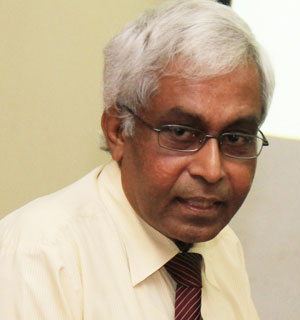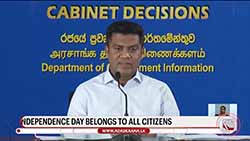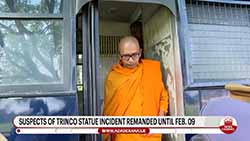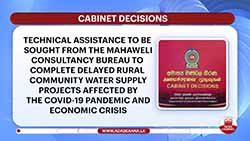Govt. neither opposed nor protested Indian Nuclear Power Plant - AEA
April 16, 2012 02:51 pm
Sri Lanka has not brought up the issue of the safety of Koodankulam Nuclear Power Plant against India’s voting at the 19th session of the UNHRC, the Atomic Energy Authority of Sri Lanka said today refuting recent reports in Indian media.
The Sri Lankan Government has neither opposed nor registered their protest for any Nuclear Power Plant on Indian soil, Chairman of Atomic Energy Authority Dr. R.L. Wijayawardana said in a statement.
Times of India on had reported that Sri Lanka’s energy minister Patali Champika Ranawaka has said they were threatened by the Koodankulam nuclear plant, in case of a Fukushima-like disaster in retaliation for India’s vote against Sri Lanka at the United Nations Human Rights Council.
TOI further said Champika Ranawaka repeatedly told journalists in Colombo that Sri Lanka would refer the matter to the IAEA at a meeting in September.
It is unfortunate that such “faulty information” have been released by TOI in order to bring tension between the two countries, Wijayawardana said.
Pointing out that both Sri Lanka and India are members of the International Atomic Energy Agency (IAEA), which is committed for using nuclear technology for the benefit of the society, he said, Sri Lanka fully understands the need of utilizing nuclear energy for electricity generation.
“India has every right to use nuclear technology in meeting the requirements of electrical energy,” he added.
Sri Lanka Atomic Energy Authority has a mandate to protect people and the environment of Sri Lanka from unwanted effects of ionizing radiation. It is the responsibility of the Government of Sri Lanka through the Sri Lanka Atomic Energy Authority to plan a Radiological Emergency Preparedness Program, Dr. Wijayawardana said.
“Such a program was drafted with the help of the Disaster Management Centre.”
“IAEA was approached by AEA to strengthen the capacity for the Radiological Emergency Preparedness Program,” he said.
Reminding that cordial discussions were held with the Indian delegation in 2010 when the Minister headed the Sri Lanka delegation to the IAEA General Conference, Dr. Wijayawardana said Minister Ranawaka had in fact visited the Koodankulam power plant with the Indian Atomic Energy Commission Chairman.
“Therefore, the statement made to give the impression that Sri Lanka is protesting to Koodankulam NPP is baseless and malicious,” he said.
It is unfortunate that remote nuclear accidents are brought up by the media, linking to UNHRC vote and using radiation safety as currency of conversation whipping up fear and insecurity, the chairman of the Atomic Energy Authority further stated.
The Sri Lankan Government has neither opposed nor registered their protest for any Nuclear Power Plant on Indian soil, Chairman of Atomic Energy Authority Dr. R.L. Wijayawardana said in a statement.
Times of India on had reported that Sri Lanka’s energy minister Patali Champika Ranawaka has said they were threatened by the Koodankulam nuclear plant, in case of a Fukushima-like disaster in retaliation for India’s vote against Sri Lanka at the United Nations Human Rights Council.
TOI further said Champika Ranawaka repeatedly told journalists in Colombo that Sri Lanka would refer the matter to the IAEA at a meeting in September.
It is unfortunate that such “faulty information” have been released by TOI in order to bring tension between the two countries, Wijayawardana said.
Pointing out that both Sri Lanka and India are members of the International Atomic Energy Agency (IAEA), which is committed for using nuclear technology for the benefit of the society, he said, Sri Lanka fully understands the need of utilizing nuclear energy for electricity generation.
“India has every right to use nuclear technology in meeting the requirements of electrical energy,” he added.
Sri Lanka Atomic Energy Authority has a mandate to protect people and the environment of Sri Lanka from unwanted effects of ionizing radiation. It is the responsibility of the Government of Sri Lanka through the Sri Lanka Atomic Energy Authority to plan a Radiological Emergency Preparedness Program, Dr. Wijayawardana said.
“Such a program was drafted with the help of the Disaster Management Centre.”
“IAEA was approached by AEA to strengthen the capacity for the Radiological Emergency Preparedness Program,” he said.
Reminding that cordial discussions were held with the Indian delegation in 2010 when the Minister headed the Sri Lanka delegation to the IAEA General Conference, Dr. Wijayawardana said Minister Ranawaka had in fact visited the Koodankulam power plant with the Indian Atomic Energy Commission Chairman.
“Therefore, the statement made to give the impression that Sri Lanka is protesting to Koodankulam NPP is baseless and malicious,” he said.
It is unfortunate that remote nuclear accidents are brought up by the media, linking to UNHRC vote and using radiation safety as currency of conversation whipping up fear and insecurity, the chairman of the Atomic Energy Authority further stated.












